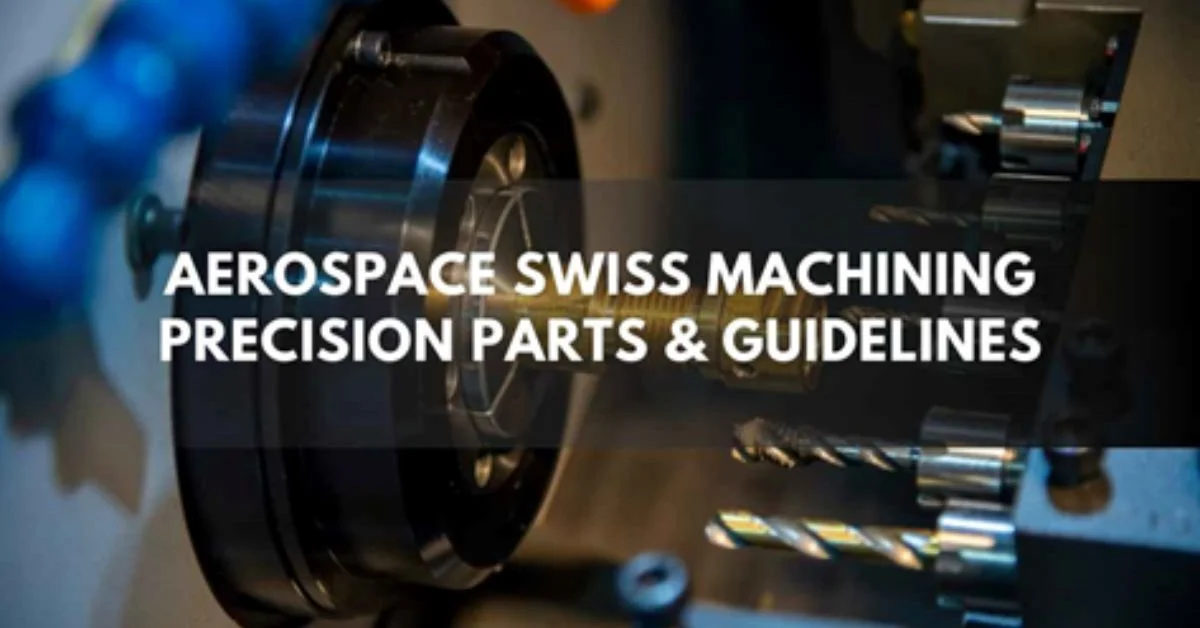The aerospace sector was significantly affected by COVID-19. It influenced commercial airlines badly as many of them were unable to fly. About 65% of global airplanes used for passenger transport were idle. Maintenance, repair, and overhaul (MRO) activities also took a thumping. Many airlines regrettably had to shut down during these challenges. The International Air Transport Association (IATA) has said that it may take around 2023-2024 for the industry to bounce back to the pre-pandemic trend. The development presents some optimism to aircraft manufacturers. Moreover, this expected growth also benefited the aerospace swiss machining industry.
What is Swiss Machining?

Precision Swiss Turning
Swiss turing/machining is a highly accurate precision-parts crafting technique. In this process, electro-mechanical Computer Numerical Control (CNC) machines operate tools in multiple axes. These machines develop small, slender, or delicate sections of various types of metals. Such materials are titanium, Kovar, aluminum, stainless steel, copper, bronze, and some types of plastics.

Swiss machine designs can be traced back more than a century ago. Due to the growing demand for pocket and wristwatches, Swiss watchmakers required even tinier elements. This demand resulted in technology that can machine these small parts without bending or breaking them. The basic mechanism of Swiss machines is used in modernity while they also employ CNC programming to ensure accurate cutting with minimal external force.
Significance of Precision Swiss Machining in Aerospace Manufacturing?
Availability and dependability are two core factors in aerospace settings. Precision Swiss turning plays a vital role in the provision of these basic requirements. These include precision, elaborate designs, exact tolerances, and narrow clearances. The level of accuracy attainable in Swiss machining is +/- 0.0002 inches and that’s why Swiss machining is notable for manufacturing intricate fine aircraft components. For instance the blades and vanes in turbines, fuel injection equipment, hydraulic parts, actuators, and parts of landing gears.
Advantages of Swiss Machining in the Aerospace Industry
Swiss machining is primarily focused on the aerospace industry. It’s particularly suitable for the production of small/slender parts and offers several benefits over conventional modes.
Tight Tolerances
Precision is always of utmost concern in aerospace applications. Because a slight variation in dimensions, tolerance, or performance may lead to failure while in flight. While machining, CNC Swiss machines hold the workpiece at the side of the operation point. They stabilize the workpiece to reduce forces exerted by tools used in its fabrication. Such design enables very high levels of accuracy particularly when working on small parts.
More Complex Parts
During fabrication, the bar stock is always well supported and thus does not require much attention. This feature allows Swiss machines to reduce the wall thickness of the part, the complexity of the feature, and the depth of the cut as compared to other machines.
Quick Turnaround Times
CNC Swiss machines are unlike most other machines because they can work independently and can run 24/7. These machines also outcompete many other techniques in terms of speed. Swiss machines are known to use three or four tools at once. Moreover, machines are versatile to perform milling, drilling, reaming, and sawing and often reduce or even bar secondary operations. Conventional machines can use anywhere between 1 hour to complete a single part while Swiss machines can fashion over 30 parts per hour depending on the size and complexity.
Guidelines on Choosing an Aerospace Swiss Machining Service Company
When selecting an aerospace Swiss machining parts provider, several critical factors should be considered:
- Assess the provider’s competence in the aerospace industry. Experience in manufacturing high-quality parts is mandatory.
- Choose a company that uses the latest technology and equipment to meet standards, and provide quality parts.
- Check whether the provider has certain certifications, as such things speak about the provider’s adherence to the standards.
- Ask for references and testimonials to understand if this provider is credible or not.
- Location always matters. Look for a nearby CNC Turning Service provider to avoid so much transporting cost or time wastage.
Swiss Machining Services: Top Industries For Aerospace Parts Craft
Many organizations have established themselves as Swiss precision machining providers for the aerospace industry. These firms have great expertise in machining products to produce higher-standard parts. Here are ten notable companies in this field:
- Prolean Tech
- Precision Aerospace Corp
- Swiss Automation, Inc.
- Swissturn, USA
- Apex Swiss
- MW Industries, Inc.
- Kaiser Aerospace
- Graham Precision
- Harrison Manufacturing
- Star Precision
Precision Aerospace Products Manufactured Using Swiss Turning
Aerospace Swiss machining helps to ensure that complex shapes and dimensions of the product correspond to the requirements of the aerospace industry. Following are some commonest components created through swiss machining for aircraft use.
- Turbine Blades
- Fuel Injectors
- Actuators
- Landing Gear Components
- Hydraulic System Parts
- Sensor Housings
- Fasteners
- Airframe Components
- Valves
- Bracket Assemblies
- Control Rods
- Gear Shafts
- Nozzles
- Support Structures
- Connectors
Final Summary – Aerospace Swiss Machining
The modern aerospace industry relies heavily on Swiss precision machining. This technique creates high-quality parts for various uses. In addition, swiss machining is unique and more beneficial compared to the conventional approaches. Some intricate components can be produced with an exact tolerance that cannot be matched by other fabrication modes. It’s essential for success to choose a reliable swiss machining services provider. Because reliable partners make sure that aerospace components are of the highest standard.
If you find this article helpful, click here for more.









